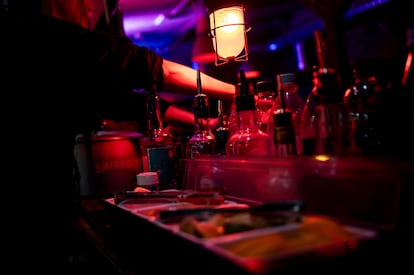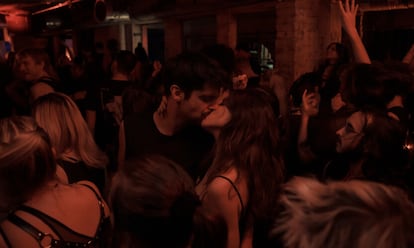Berlin is known throughout the world for its famous clubs, which attract millions of electronic music fans year after year and where parties and imagination have no limits, no time. What will happen to the German capital if these places continue to disappear? That is the fear that grips many of its inhabitants these days since Watergate, described as one of the best clubs in the world by the British magazine DJ Magwill announce its definitive closure at the end of the year. It is nevertheless ironic that a few months after Berlin’s techno club culture was included in UNESCO’s list of intangible cultural heritage, Watergate announced its end, thus joining Wilde Renate, another Berlin nightlife institution where , at the end of 2025, the music will also stop playing.
“These are difficult times for Berlin clubs, and since Covid, business has not picked up for many. Whether due to high rents, inflation, rising costs or simply a change in the dynamics of nightlife,” Watergate explained on its website when announcing the news of its closure after 22 years in operation.
Those responsible for the club, founded at the time in an empty building in a then unattractive area of the Kreuzberg district, decided not to extend the contract with the controversial Berlin real estate businessman Gijora Padovicz, also owner of the Wilde Renate building. The Watergate will celebrate its last party on New Year’s Eve in its privileged location on the Spree River. “We invite you to one last dance,” those responsible wrote.
Since its announcement, the already long line at its doors has only grown. Nobody wants to miss that last dance. “We say goodbye, and we do it in style, because as they say: The party is over, long live the party!”
The Wilde Renate, founded in 2007 and located in an unrenovated building in the Friedrichshain district, is also preparing to say goodbye. His contract expires next year. According to those responsible, Padovicz has doubled the rent and the possible extension has failed. Along with these two clubs, others like ://about blank are in danger due to the construction plans for one of the sections of the A100 motorway.
The fact that clubs have to abandon their premises is nothing new for a culture that flourished thanks to the large number of empty buildings left after the fall of the Berlin Wall. However, unlike the 90s, there are almost no new spaces where they can reopen and they are more inaccessible. Real estate speculation, which has raised rents to levels unthinkable ten years ago, has made it almost impossible to find alternative sites. For the Berlin club network Clubcommission, the closure of Watergate and Renate is a worrying sign for the entire Berlin scene. “Almost half of club managers are considering closing in the next twelve months,” explains Lutz Leichsenring, spokesperson for the association that ensures their protection. “Clubs are facing huge running costs, rising rents and falling demand,” he says.
According to Marcel Weber, president of Clubcommission, adding to these problems is the economic crisis that Germany is experiencing, which has caused less consumption. Likewise, fewer people are coming to Berlin compared to before the pandemic due, above all, to the high airport taxes, which has meant that the golden age of cheap flights to come to Berlin to party is behind us.
Despite everything, Berlin continues to maintain its fame, and clubs like the Berghain, considered the temple of electronic music and which celebrated its 20th anniversary in style in mid-December, are still at full capacity. In their case, they have been owners of the old power plant building since 2010, although that did not prevent rumors of a possible sale of the building from spreading two years ago.
“Berlin is still the place where people want to go. We have the task of preserving it,” says Weber, sitting inside the Deutsches Theater. “Clubs make Berlin coolbut they also mean freedom,” he comments. “On the dance floor it doesn’t matter where you come from, what color your skin is, what you believe in, what identity or gender you feel you belong to, how old you are. “I think that’s something you can only experience in Berlin,” he adds of the clubs where there is a strict no-photo policy, which creates that unique feeling of freedom.

To Weber, who was manager of the club for 25 years queer SchwuZ, the clubs helped him socialize. “The club culture has allowed me to discover who I really am and who I want to be. And I don’t think that would have been possible without her,” he says. However, despite the problems, he prefers to talk about “a new era” rather than the end of one. “Now we have to see how we can continue making the most of what we have,” he reflects on some places, “where you can do many things that you can’t do in other places, whether it’s dressing daringly or celebrating parties. sex-positive”.
The clubs are also an important source of income for the city. According to a recent study by Clubcommission, they represent annual revenues of almost 1.5 billion euros for Berlin. Many start-ups They say they choose Berlin for its cultural life, which allows them to attract qualified labor more easily. “This is something that politicians should not forget,” says the famous Berlin DJ Dr.Motte, co-creator of the legendary Loveparade, which in the 1990s brought together more than a million people to the rhythm of techno. In his opinion, meetings should be organized with the authorities to see how to preserve them. “Doing nothing is not an option,” he says.
For now, the fear that other cities will gain prominence over the German capital has not materialized. “Berlin has had a great reputation since the 90s, I don’t think that will change anytime soon. But we have to make sure that the foundations for this are maintained at all levels,” explains the creator of the Rave The Planet collective by phone. “There are many clubs that have existed for a long time and for which people come to Berlin and we hope it continues to be like this,” he says about some clubs whose great diversity stands out. “That’s what makes them special and that’s why people come to Berlin.”
However, it is not just the clubs that are experiencing difficulties. The city’s main theaters have been on a warpath for weeks with the Berlin Government – led by the Christian Democratic Union (CDU) in coalition with the Social Democrats (SPD) – which wants to save 3 billion euros next year. This represents a 12% cut in the culture budget (130 million euros).
“The problem is that no one has explained to us why we have to save this amount and there is a lack of a clear vision,” criticizes Iris Laufenberg, director of the Deutsches Theater, in a small meeting with foreign journalists. “Well, they do have a vision and it is more police and security,” says Annemie Vanackere, director of the independent theater HAU. “They forget that through culture we also contribute to a safer society.”
“The whole culture of Berlin is what makes the city attractive. If one leg of the culture falls, it affects all of them. “Berlin is an open city where culture is important,” adds Sabine Kroner, director of the Berlin Mondiale artists network.
Berlin thrives on its world-famous culture. Art, its three operas, numerous theaters, museums and clubs make Berlin what it is. What would be left of the German capital without all this? “I’m sorry, but apart from culture, Berlin has nothing to offer,” the newspaper recently wrote. The world. Its future may be uncertain, but one thing is clear and that is that the Berlin of the 90s is disappearing and is not coming back.

